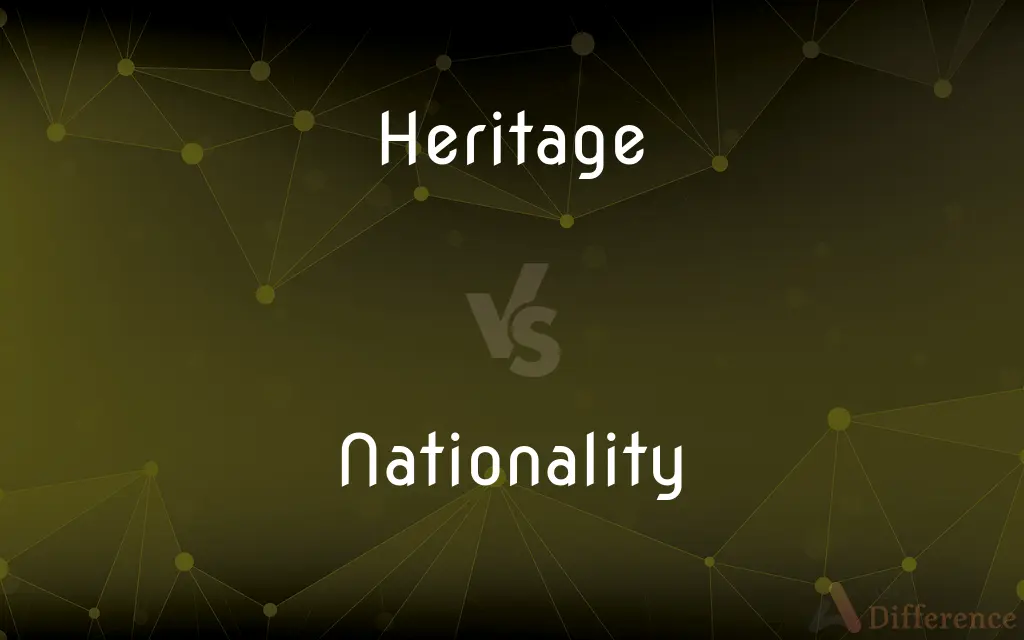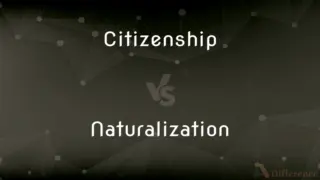Heritage vs. Nationality — What's the Difference?
By Urooj Arif & Maham Liaqat — Updated on April 18, 2024
Heritage refers to the cultural traditions and historical legacies inherited from previous generations, while nationality denotes the legal affiliation or citizenship of a person with a specific country.

Difference Between Heritage and Nationality
Table of Contents
ADVERTISEMENT
Key Differences
Heritage encompasses the cultural, historical, and social practices passed down through generations, such as customs, languages, and beliefs. Heritage is often shared among people of the same ethnic or cultural group, transcending national boundaries. On the other hand, nationality is a legal identity that connects an individual to a nation-state. It provides legal rights and obligations, such as voting, passport entitlements, and national defense.
Heritage shapes a person's identity in cultural and social terms, influencing things like cuisine, religious practices, and artistic expressions. Whereas nationality primarily dictates the legal and political aspects of identity, including civic duties and rights within a particular country.
While heritage can be multiple and layered, reflecting the complex histories and migrations of families and communities, nationality is typically singular or limited to dual nationality, based on the laws of the respective countries. This difference highlights how heritage can encompass a broader range of influences compared to the more legally defined concept of nationality.
Heritage often remains unchanged as it is passed from generation to generation, aiming to preserve the traditions and values of a culture. Conversely, nationality can change through naturalization, renunciation, or changes in political boundaries, reflecting more fluid and administrative aspects.
The exploration of one's heritage can be a deeply personal and lifelong journey, involving the discovery of ancestral roots and cultural practices. In contrast, nationality is often established at birth or through legal processes, such as naturalization, and is usually documented and recognized officially.
ADVERTISEMENT
Comparison Chart
Definition
Cultural and historical legacies passed down through generations.
Legal relationship between an individual and a nation-state.
Nature
Cultural and historical.
Legal and political.
Stability
Generally constant, focusing on preservation.
Can change due to naturalization or changes in national borders.
Influence
Affects cultural identity and social practices.
Determines civic rights and duties within a country.
Scope
Can be shared across national boundaries and is often multi-faceted.
Usually singular or dual, strictly defined by legal criteria.
Compare with Definitions
Heritage
Cultural practices inherited from ancestors.
My family's heritage includes a rich tradition of Irish folk music.
Nationality
The status of belonging to a particular nation by origin or naturalization.
Her nationality changed following her naturalization ceremony.
Heritage
Historical legacies preserved across generations.
The heritage sites we visited on our trip stood as a testament to our nation's history.
Nationality
Legal citizenship of a person within a country.
My nationality is Canadian, though I've lived abroad for years.
Heritage
Ethnic background and lineage.
My heritage is a blend of Italian and Puerto Rican influences.
Nationality
An attribute of identity often associated with patriotism.
She expresses her nationality through her dedication to national causes.
Heritage
Artistic expressions from one's cultural background.
The pottery techniques I use are a part of my Native American heritage.
Nationality
A basis for certain legal rights, like voting.
His nationality entitles him to vote in the national elections.
Heritage
Traditional beliefs passed down through family lines.
Spiritual healing, part of our heritage, has always been revered in my family.
Nationality
A legal identifier used on international documents.
Your nationality must be declared on all immigration forms.
Heritage
Property that is or may be inherited; an inheritance
They had stolen his grandfather's heritage
Nationality
Nationality is a legal identification of a person in international law, establishing the person as a subject, a national, of a sovereign state. It affords the state jurisdiction over the person and affords the person the protection of the state against other states.Article 15 of the Universal Declaration of Human Rights states that "Everyone has the right to a nationality," and "No one shall be arbitrarily deprived of his nationality nor denied the right to change his nationality." By international custom and conventions, it is the right of each state to determine who its nationals are.
Heritage
A special or individual possession; an allotted portion
God's love remains your heritage
Nationality
The status of belonging to a particular nation by origin, birth, or naturalization.
Heritage
Christians, or the ancient Israelites, seen as God's chosen people.
Nationality
A people having common origins or traditions and often constituting a nation.
Heritage
Property that is or can be inherited; an inheritance.
Nationality
Existence as a politically autonomous entity; national independence.
Heritage
Something that is passed down from preceding generations; a tradition.
Nationality
National character.
Heritage
The status acquired by a person through birth; a birthright
A heritage of affluence and social position.
Nationality
Nationalism.
Heritage
A domesticated animal or a crop of a traditional breed, usually not widely produced for commercial purposes.
Nationality
National, i.e. ethnic and/or cultural, character or identity.
Heritage
An inheritance; property that may be inherited.
Nationality
Nationalism or patriotism.
Heritage
A tradition; a practice or set of values that is passed down from preceding generations through families or through institutional memory.
Nationality
National origin or identity; legal membership of a particular nation or state, by origin, birth, naturalization, ownership, allegiance or otherwise.
By living in the country for five years, you are entitled to get nationality.
Stefi was born in Spain to a Brazilian father and a Chilean mother, so is eligible for three nationalities.
Please include your nationality on the form.
Heritage
A birthright; the status acquired by birth, especially of but not exclusive to the firstborn.
Nationality
A people sharing a common origin, culture and/or language, and possibly constituting a nation-state.
Heritage
(attributive) Having a certain background, such as growing up with a second language.
A heritage speaker; a heritage language
The university requires heritage Spanish students to enroll in a specially designed Spanish program not available to non-heritage students.
Nationality
(obsolete) Political existence, independence or unity as a national entity.
Heritage
That which is inherited, or passes from heir to heir; inheritance.
Part of my heritage,Which my dead father did bequeath to me.
Nationality
The quality of being national, or strongly attached to one's own nation; patriotism.
Heritage
A possession; the Israelites, as God's chosen people; also, a flock under pastoral charge.
Nationality
The sum of the qualities which distinguish a nation; national character.
Heritage
Practices that are handed down from the past by tradition;
A heritage of freedom
Nationality
A race or people, as determined by common language and character, and not by political bias or divisions; a nation.
The fulfillment of his mission is to be looked for in the condition of nationalities and the character of peoples.
Heritage
Any attribute or immaterial possession that is inherited from ancestors;
My only inheritance was my mother's blessing
The world's heritage of knowledge
Nationality
Existence as a distinct or individual nation; national unity and integrity.
Heritage
Hereditary succession to a title or an office or property
Nationality
The state or quality of belonging to or being connected with a nation or government by nativity, character, ownership, allegiance, etc.; as, to record one's nationality on identification papers; the Soviet Union had citizens of many nationalities.
Nationality
The status of belonging to a particular nation by birth or naturalization
Common Curiosities
What is the main difference between heritage and nationality?
Heritage relates to cultural and historical legacies, while nationality is a legal bond with a country.
Can someone's heritage affect their nationality?
Heritage itself does not affect legal nationality, though it can influence a person's sense of belonging to a nation.
Does heritage have any legal implications?
While heritage influences cultural identity, it generally has no direct legal implications.
How can nationality be changed?
Nationality can be changed through naturalization, marriage, or renunciation.
Can you lose your heritage?
While cultural practices can diminish over time, heritage as a whole is often retained through familial and community memory.
How is heritage preserved?
Heritage is preserved through education, cultural practices, and formal preservation efforts.
How do heritage and nationality impact an individual's identity?
Heritage shapes cultural identity while nationality defines legal and civic identity.
Is it possible to have multiple heritages?
Yes, many people inherit and identify with multiple cultural heritages.
Can heritage and nationality conflict?
In some cases, personal cultural heritage can conflict with national identity or policies.
Why is understanding heritage important?
Understanding heritage can enhance personal identity and promote respect for diversity.
What legal rights does nationality confer?
Nationality typically confers the right to vote, work, and live in a country.
What roles do governments play in protecting heritage?
Governments can protect heritage by enacting preservation laws and supporting cultural activities.
Is nationality always tied to a specific geographic location?
Yes, nationality is tied to specific nation-states, each with defined geographical boundaries.
What documents prove nationality?
Nationality is usually proven by birth certificates, passports, or citizenship certificates.
How does one acquire nationality?
Nationality is usually acquired by birth, descent, or through naturalization processes.
Share Your Discovery

Previous Comparison
Citizenship vs. Naturalization
Next Comparison
Forbearing vs. BearingAuthor Spotlight
Written by
Urooj ArifUrooj is a skilled content writer at Ask Difference, known for her exceptional ability to simplify complex topics into engaging and informative content. With a passion for research and a flair for clear, concise writing, she consistently delivers articles that resonate with our diverse audience.
Co-written by
Maham Liaqat















































